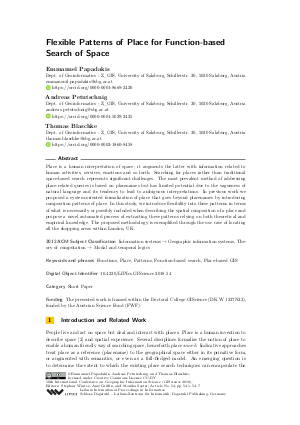Flexible Patterns of Place for Function-based Search of Space (Short Paper)
Authors
Emmanuel Papadakis  ,
Andreas Petutschnig
,
Andreas Petutschnig  ,
Thomas Blaschke
,
Thomas Blaschke 
-
Part of:
Volume:
10th International Conference on Geographic Information Science (GIScience 2018)
Part of: Series: Leibniz International Proceedings in Informatics (LIPIcs)
Part of: Conference: International Conference on Geographic Information Science (GIScience) - License:
 Creative Commons Attribution 3.0 Unported license
Creative Commons Attribution 3.0 Unported license
- Publication Date: 2018-08-02
File

PDF
LIPIcs.GISCIENCE.2018.54.pdf
- Filesize: 379 kB
- 7 pages
Document Identifiers
Subject Classification
ACM Subject Classification
- Information systems → Geographic information systems
- Theory of computation → Modal and temporal logics
Keywords
- Functions
- Place
- Patterns
- Function-based search
- Place-based GIS
Metrics
- Access Statistics
-
Total Accesses (updated on a weekly basis)
0Document
0Metadata
Abstract
Place is a human interpretation of space; it augments the latter with information related to human activities, services, emotions and so forth. Searching for places rather than traditional space-based search represents significant challenges. The most prevalent method of addressing place-related queries is based on placenames but has limited potential due to the vagueness of natural language and its tendency to lead to ambiguous interpretations. In previous work we proposed a system-oriented formalization of place that goes beyond placenames by introducing composition patterns of place. In this study, we introduce flexibility into these patterns in terms of what is necessarily or possibly included when describing the spatial composition of a place and propose a novel automated process of extracting these patterns relying on both theoretical and empirical knowledge. The proposed methodology is exemplified through the use case of locating all the shopping areas within London, UK.
Cite As Get BibTex
Emmanuel Papadakis, Andreas Petutschnig, and Thomas Blaschke. Flexible Patterns of Place for Function-based Search of Space (Short Paper). In 10th International Conference on Geographic Information Science (GIScience 2018). Leibniz International Proceedings in Informatics (LIPIcs), Volume 114, pp. 54:1-54:7, Schloss Dagstuhl – Leibniz-Zentrum für Informatik (2018)
https://doi.org/10.4230/LIPIcs.GISCIENCE.2018.54
BibTex
@InProceedings{papadakis_et_al:LIPIcs.GISCIENCE.2018.54,
author = {Papadakis, Emmanuel and Petutschnig, Andreas and Blaschke, Thomas},
title = {{Flexible Patterns of Place for Function-based Search of Space}},
booktitle = {10th International Conference on Geographic Information Science (GIScience 2018)},
pages = {54:1--54:7},
series = {Leibniz International Proceedings in Informatics (LIPIcs)},
ISBN = {978-3-95977-083-5},
ISSN = {1868-8969},
year = {2018},
volume = {114},
editor = {Winter, Stephan and Griffin, Amy and Sester, Monika},
publisher = {Schloss Dagstuhl -- Leibniz-Zentrum f{\"u}r Informatik},
address = {Dagstuhl, Germany},
URL = {https://drops.dagstuhl.de/entities/document/10.4230/LIPIcs.GISCIENCE.2018.54},
URN = {urn:nbn:de:0030-drops-93825},
doi = {10.4230/LIPIcs.GISCIENCE.2018.54},
annote = {Keywords: Functions, Place, Patterns, Function-based search, Place-based GIS}
}
Author Details
- Dept. of Geoinformatics - Z_GIS, University of Salzburg, Schillerstr. 30, 5020 Salzburg, Austria
- Dept. of Geoinformatics - Z_GIS, University of Salzburg, Schillerstr. 30, 5020 Salzburg, Austria
Funding
The presented work is framed within the Doctoral College GIScience (DK W 1237N23), funded by the Austrian Science Fund (FWF).
References
-
Alexander Chagrov. Modal logic. Oxford Logic Guides, 1997.

-
Michael R Curry. The work in the world: geographical practice and the written word. U of Minnesota Press, 1996.

-
Martin Doerr. The CIDOC conceptual reference module: an ontological approach to semantic interoperability of metadata. AI magazine, 24(3):75, 2003.

-
Michael F Goodchild and Linda L Hill. Introduction to digital gazetteer research. International Journal of Geographical Information Science, 22(10):1039-1044, 2008.

-
Nicola Guarino, Daniel Oberle, and Steffen Staab. What is an ontology? In Handbook on ontologies, pages 1-17. Springer, 2009.

-
Linda L Hill. Core elements of digital gazetteers: placenames, categories, and footprints. In International Conference on Theory and Practice of Digital Libraries, pages 280-290. Springer, 2000.

-
Emmanuel Papadakis and Thomas Blaschke. Place-based GIS: Functional Space. Proceedings of the 4th AGILE PhD School, 2088, 2017.

-
Emmanuel Papadakis and Thomas Blaschke. Composition of Place: Components and Object Properties. International Journal of Geo-information, 2018. Submitted, under review.

-
Simon Scheider and Ross Purves. Semantic Place Localization from Narratives. In Proceedings of The First ACM SIGSPATIAL International Workshop on Computational Models of Place, pages 16:16-16:19, New York, NY, USA, 2013. ACM.

-
Gao Song, Janowicz Krzysztof, and Couclelis Helen. Extracting urban functional regions from points of interest and human activities on location‐based social networks. Transactions in GIS, 21(3):446-467, 2017.

-
Yi-Fu Tuan. Space and Place: Humanistic Perspective. In Philosophy in geography, pages 387-427. Springer, 1979.

-
Maria Vasardani, Martin Tomko, and Stephan Winter. The Cognitive Aspect of Place Properties. In International Conference on GIScience Short Paper Proceedings, volume 1, 2016.

